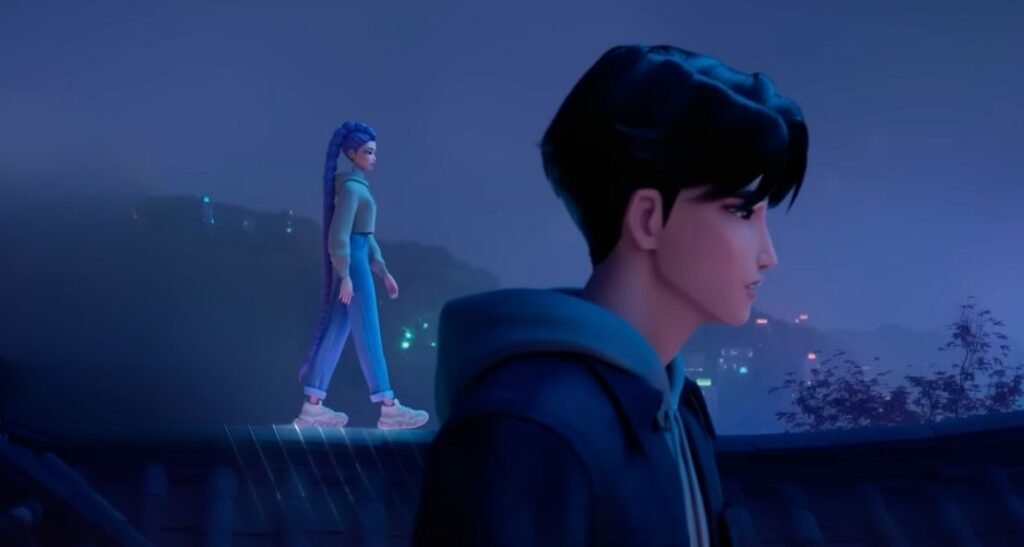“Free” arrives in the film at the moment Rumi finally drops her armour around Jinu, and the story pivots from suspicion to trust.
On record, it’s billed to Rumi & Jinu with EJAE and Andrew Choi; EJAE carries Rumi’s vocal, Choi carries Jinu’s, and it appears on KPop Demon Hunters (Soundtrack from the Netflix Film), released on 20 June 2025 through Republic.
The track runs 3:07, which feels just long enough for a confession and an answer.
Listening closely, the first verse sketches burnout and fear with plain language.
“I tried to sing, couldn’t hit the notes” lands softly because the melody sits low and chesty before it opens into the chorus.
Inside the movie, that line stops being figurative; I read it against the tightening demon marks at Rumi’s throat, so what could be a diary confession becomes literal on screen.
The chorus distils the challenge into a single line, “We can’t fix it if we never face it,” while the bridge carries the phrase I keep returning to, “Let the past be the past ’til it’s weightless.”
A little later comes the line that unlocks Jinu’s verse for me, “Hope only hurts, so I just forget it,” and that’s where his delivery starts switching gears.
The credits explain why the song feels so current without chasing a cheap crescendo.
“Free” is written by Jenna Andrews, Stephen Kirk, and Mark Sonnenblick, and produced by Andrews, Kirk, and executive music producer Ian Eisendrath, the same core behind the album’s clean, theatre-aware pop.
Eisendrath has described K-pop as intensely theatrical, and taken that way, this is character work first and a playlist cut second.
On headphones, the engineering choices do a lot of the emotional lifting.
The opening keeps EJAE very close to the mic, breaths intact, so the first leap into the chorus feels earned rather than telegraphed.
Piano sits to the left, strings swell on the right, and the harmony opens under her without turning syrupy.
When Andrew Choi enters, he flips his delivery into a more percussive, almost rap-inflected cadence, then smooths into sustained notes; that switch is why the second verse feels like changing gear without losing the road.
The ending resolves as a true duet. Their lines dovetail instead of ping-ponging, so the last refrain reads like a pact rather than a solo confession.
Watching the official lyric video, I like how the clip keeps typography and film stills simple enough that the voices stay in front, which suits the song’s intimacy; it’s also the version people pass around when they want to show where Rumi and Jinu stop hiding and finally say what they actually want.
Inside the film, this is where partnership takes root. Executive music producer Ian Eisendrath frames it as two people singing to each other and sharing things they’ve probably never shared, a musical picture of what they want to be; that matches what I hear in the writing, and it’s why the refrain feels like advice rather than a slogan.
The song didn’t stay trapped in the scene. The soundtrack reached No. 1 on the Billboard 200 on the chart dated 20 September 2025, earning about 128,000 equivalent album units in the U.S. that week, its best frame, following months of steady climb.
One clear headline says enough; the chart-topping week is the one that cemented the album as more than a movie companion.
Covers helped that afterlife. Andrew Choi publicly praised actor Ahn Hyo-seop’s rendition as “perfect,” which tells you how singable the topline is beyond the film, and the Arden Cho/Cha Eun-woo acoustic take doubles down on the duet’s tenderness without losing the rhythmic bite of Jinu’s verse; both are worth a watch when you’ve played the original to death.
If you’re coming in cold and searching for K-pop Demon Hunters’ “Free” lyrics meaning, the heart of it is a mutual dare.
The song asks two people who think they’re broken to stop editing themselves and show the worst parts first.
The melody is engineered to comfort, the arrangement is engineered to rise, and the rhyme density spikes where the feelings spike—listen to “imposter, monster” clicking into place just before the final lift.
By the time that last refrain hits, it’s not cleverness you notice; it’s the relief of naming a fear with someone safe beside you. And that’s why this ballad is more than pretty; it’s useful.
You might also like:
- KPop Demon Hunters “Golden” lyrics meaning: the cinematic anthem that anchors the soundtrack
- HUNTR/X “How It’s Done” — lyrics meaning: propulsive confidence with theatre-pop bite
- “Your Idol” from KPop Demon Hunters — the villain anthem that hijacks fandom
- Saja Boys “Soda Pop” — lyrics & meaning: weaponised charm from the Saja Boys
- TWICE “Takedown” (KPop Demon Hunters) — studio cut vs. in-film battle cry
- HUNTRIX “What It Sounds Like” — a late-film choice set to a tender lift


